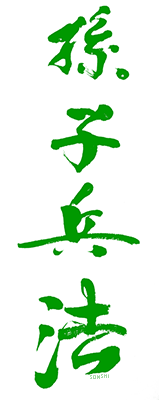When I first studied Sun Tzu's Art of War over 30 years ago, I knew what I had in my hands was remarkable advice and information. You would think I wanted to keep this advice and information to myself, much like what the feudal Japanese warlords did when they secretly studied their coveted copy of Sonshi (a Japanese transliteration of Sun Tzu).
But I was lucky. I had a wise teacher. The first Art of War book I studied was from Dr. Thomas Cleary published in 1988 (who 20 years later wrote the Preface for our own Art of War book published in 2008). In his Art of War book's introduction, Dr. Cleary refers to a very famous Chinese novel called "Journey to the West," published in circa 1592 AD.
"Journey to the West" tells a story about a magical monkey who eventually became the Monkey King after stealing the devil's sword, became a master in swordsmanship, and founded a monkey civilization. However, even though he was a ruler of an entire nation, he wasn't a ruler of himself. Because of his lack of wisdom, he created a dangerous arms race with neighboring nations. Fortunately, the Monkey King meets Buddha who conquered the Monkey King's ignorance through education.
As a reminder of this education, Buddha slips on a ring around the Monkey King's head that tightens whenever he acts without compassion. Likewise, with Sun Tzu's Art of War, Dr. Cleary wrote:
"The Art of War has been known for a hundred generations as the foremost classic of strategy; but perhaps its greatest wizardry lies in the ring of compassion that Master Sun [Sun Tzu] slips over the head of every warrior who tries to use this book. And as history shows, the magic spell that tightens its grip is chanted whenever a warrior forgets the ring." Thomas Cleary
When you have two sides who are fully aware of Sun Tzu's Art of War, they would only engage in battle if victory is assured. But since there can only be one winner in war, one of them will refuse to fight. Unlike simulated competition like in sports where two sides must compete, in war one can always choose to not fight.
An argument might be made that this is merely delaying a fight. But it isn't so simple. First, peace now is better than peace later. Second, with the passage of time, sentiments can change, allowing for more opportunities for reconciliation. And third, according to Sun Tzu, as long as at least one side is wise and proficient at strategy, peace will continue if that side so chooses, especially in defense:
"Those skilled in warfare can make themselves invincible, but cannot necessarily cause the enemy to be vulnerable. Therefore it is said one may know how to win but cannot necessarily do it. One takes on invincibility defending; one takes on vulnerability attacking." Sun Tzu
Ideally, if everyone in the world is a student of Sun Tzu's Art of War, we would not have more wars, but instead we would have more educated people who truly understand the full costs of war and have the mindset, creativity, and compassion to resolve differences. Unless every option has been exhausted, the mere suggestion of war would be outrageous and absurd. War, in essence, would be viewed as a failure and a shame to all involved.
Therefore, to answer the question "Should you share Sun Tzu's Art of War with others?", I emphatically say, "Yes!"
I have seen with my own eyes the positive difference it makes in people's lives. Sun Tzu students aren't only more empowered but they are empowering others. Through the use of logic and reason, they care about another person even if nobody else does. They are kind to others knowing that kindness doesn't diminish their power or strength, and often quite the reverse is true. There have been countless times I have observed people's eyes light up after reading Sun Tzu's Art of War but it's not surprising because that was how I was when I first read the book.
Alas, war hawks and chickenhawks who quote Sun Tzu almost always quote him incorrectly (misattributing the quote to Sun Tzu or misunderstanding the quote altogether) and have apparently not pondered beyond mere quotes. These are the people I want to reach out and educate, if it's not too late.
Educating others and learning from others about Sun Tzu's Art of War are so satisfying that I will continue what I'm doing. I hope you are benefiting from Sonshi, our Art of War book, and these blog entries. I hope you spread the word far and wide.
I will leave you today with a wonderful concluding sentence in Dr. Thomas Cleary's introduction, which so correctly and perceptively sums up why I continue to study Sun Tzu's Art of War after 30 years and what many of you might have already observed in your own study:
"Classics [like Sun Tzu's Art of War] may be interesting and even entertaining, but people always find they are not like books used for diversion, which give up all of their content at once; the classics seem to grow wiser as we grow wiser, more useful the more we use them." Thomas Cleary


 RSS Feed
RSS Feed